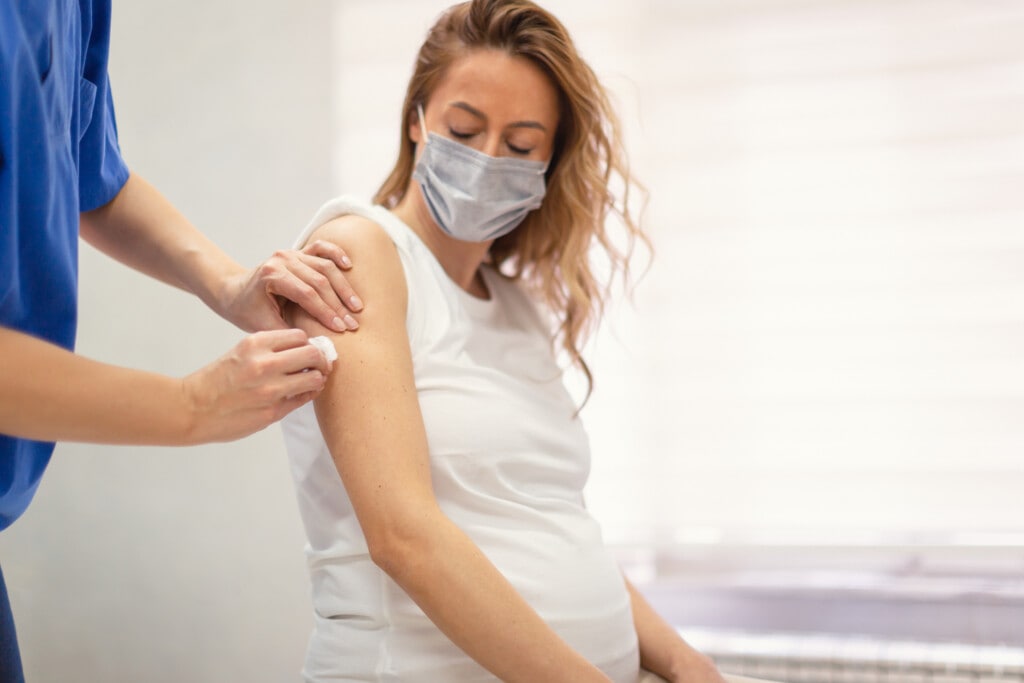If you are pregnant right now, chances are you’ve been asked questions about your due date, your baby’s gender, the name(s) you have picked out, and where you will be delivering. You may have even been asked about whether or not you are planning on getting a Covid vaccine. This makes sense since we are still in the midst of a pandemic, and the Covid vaccines have now been available for several months.
Some pregnant women have made their decision as to whether or not to get the vaccine. Many other women are still in the information-gathering phase. That is totally okay. Here are some common questions and answers about getting the Covid vaccine while pregnant:
What do the “experts” recommend about getting vaccinated while pregnant?
The American College of Obstetricians and Gynecologists (ACOG) does not make a blanket statement recommending universal vaccination during pregnancy. But they do suggest that all women should have access to the vaccine during pregnancy. This is because pregnant women are at a much higher risk of complications if they get Covid than the general population, including severe illness (i.e., pneumonia), needing to be admitted to the ICU, miscarriage, stillbirth, and death.
Is there any solid data about the outcomes of pregnant women who have gotten the Covid vaccine?
To date, the Centers for Disease Control (CDC) and vaccine manufacturers have not found safety concerns surrounding the administration of the vaccine to pregnant women. There has also been reassuring information in this regard in the medical literature in the last few weeks. The New England Journal of Medicine published a report of the outcomes of over 35,000 women who were vaccinated against Covid while pregnant between December 2020 and April 2021. Rates of adverse pregnancy outcomes, including miscarriage and preterm birth, were found to be the same in pregnant women who received the Covid vaccine and pregnant women who did not receive the vaccine.
Does the Covid vaccine really cause infertility?
Researchers from Northwestern University recently published a study of 84 women who received the Covid vaccine while pregnant. In their research, pregnant women’s placentas were not affected by the vaccine. These encouraging results debunk the myth that the Covid vaccine causes infertility (pregnancy loss) by attacking the placenta. Experts from Johns Hopkins University help to clear up confusion regarding the vaccine and infertility on their website, stating:
Confusion arose when a false report surfaced on social media, saying that the spike protein on this coronavirus was the same as another spike protein called syncytin-1 that is involved in the growth and attachment of the placenta during pregnancy. The false report said that getting the COVID-19 vaccine would cause a woman’s body to fight this different spike protein and affect her fertility. The two spike proteins are completely different and distinct. Getting the COVID-19 vaccine will not affect the fertility of women seeking to become pregnant, including through in vitro fertilization methods.
On the flip side, getting vaccinated during pregnancy might actually be beneficial to the fetus. There is an increasing number of reports of babies born to vaccinated mothers having protective IgG antibodies in their bloodstreams. These antibodies travel from mother to baby during pregnancy via the placenta and likely protect against infection.
Do I need to be worried about blood clots if I get the Covid vaccine while pregnant?
The CDC and ACOG do not recommend one type of vaccine over another during pregnancy. But we know that there is a small risk of blood clots in women of reproductive age who have received the Janssen/Johnson and Johnson (J&J) adenovirus vaccine. This clotting disorder, called thrombosis with thrombocytopenia syndrome (TTS), is associated with developing a very serious type of blood clot in the brain called a central venous thrombosis in women aged 18-49. Although the risk of post-vaccine TTS is very low (about 1 in 7 million), ACOG does state the following on their website:
…they should be aware of the rare risk of TTS after receipt of the Janssen COVID-19 vaccine and that other FDA-authorized COVID-19 vaccines are available (i.e., mRNA vaccines). Patients who choose not to receive the Janssen COVID-19 vaccine should be strongly encouraged to receive one of the other COVID-19 vaccines available under EUA.
Pfizer and Moderna make the two mRNA vaccines currently widely available in the U.S. One downside to the mRNA vaccines is that they require two doses to be fully immunized instead of the one dose for the J&J vaccine.
Can Covid vaccine side effects harm an unborn baby?
If you choose to get vaccinated during pregnancy, your risk of post-vaccine side effects is the same as for non-pregnant people. The most common side effects include arm pain at the injection site, headaches, fevers, muscle pains, and fatigue. Despite rumors floating around the internet, the fever that develops after getting vaccinated is not high enough to hurt your developing baby. If you experience post-vaccine side effects, the best way to treat symptoms while pregnant is with acetaminophen (Tylenol). Pregnant women cannot take ibuprofen, or other similar drugs, due to linkage with heart and lung problems in newborns.
Please remember that deciding whether or not to get vaccinated is a very personal choice! For every pregnant woman who decides to get the Covid vaccine, another mother will opt out. Both mothers’ decisions need to be respected. It’s hard enough to be pregnant in the middle of a pandemic. The last thing women need is to be criticized for their choices to protect themselves and their babies.



































